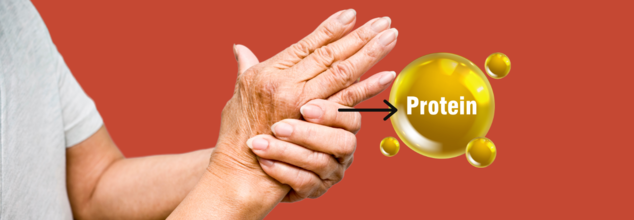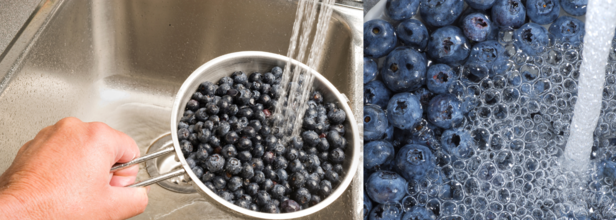- Health Conditions A-Z
- Health & Wellness
- Nutrition
- Fitness
- Health News
- Ayurveda
- Videos
- Medicine A-Z
- Parenting
- Web Stories
People Eating Too Much Protein Could Be Worsening Joints With Diet Mistake

World Protein Day is observed every year on February 27, highlighting the crucial importance of protein in human diet. It makes people aware of protein-based foods, fighting against deficiencies, and ensuring world health through proper dietary habits.
From granola bars to pasta, the deluge of high-protein foods lining the aisles of grocery stores may have you questioning whether you need more of it in your diet. Although most Americans are already meeting their protein needs—particularly in the form of red meat—there are some groups, such as older adults, people with chronic diseases, vegans, and extremely physically active individuals, who could be falling short. Nevertheless, not all protein is equal. Packaged high-protein foods often contain added sugars and calories, so it's better to stick with whole food sources.
While proper protein nutrition maintains muscle strength and immune responses, the nature and quantity of protein consumed has a direct impact on the arthritis condition. Know the appropriate composition of protein food to control arthritis efficiently, regain mobility, and alleviate pain. On World Protein Day, let us not fail to note how protein influences the health of our joints.
For those living with arthritis, protein is significant in keeping up muscle strength, joint health, and even inhibiting inflammation. But how much protein is enough, and through what foods is it best ingested? Let's dive in and discuss how protein is connected to arthritis, its effect on various types of arthritis, and how to have a smart menu.
Protein is made up of amino acids, which are the body's building blocks. They are involved in the development of muscle, bone, and cartilage, and thus are crucial to mobility and strength in general. Protein is not a direct source of energy, but it is used for tissue repair and maintenance, which is particularly vital for individuals with arthritis. Individuals with joint pain and stiffness require a constant supply of good-quality protein coupled with regular exercise to ensure muscle function and mobility.
Moreover, protein can also support weight control. Being overweight will aggravate arthritis symptoms, especially in osteoarthritis, by putting added stress on joints. Foods containing protein can satisfy hunger, avoid overeating, and maintain weight.
How Much Protein Is Too Much?
The U.S. Dietary Reference Intake (DRI) suggests a daily protein consumption of 0.8 grams per kilogram of body weight, or about 58 grams for a 160-pound person. But most health professionals believe that the majority of people—particularly those with arthritis—can do better. Consuming at least 30 grams of protein per meal maximizes muscle protein synthesis, which is more and more seen as a determining factor in longevity and overall health.
Consuming more than 22 % of daily calories from protein carries more downside risk than dietary benefit. For a normal adult, 20 to 30 grams of protein per meal, or 60 to 90 grams of protein per day is adequate to support health.
Arthritis Types and How They Relate to Protein
Arthritis is not a uniform condition, and the impact of protein on each type differs accordingly:
Osteoarthritis (OA): A deteriorating joint disease in older adults. Excess weight can cause cartilage degeneration, hence maintaining weight through proper diet, including protein from lean sources, is essential.
Rheumatoid Arthritis (RA): An autoimmune condition that results in inflammation of several joints, often occurring in women. Some protein foods, like those containing high levels of omega-6 fatty acids, can increase inflammation, whereas omega-3 sources can be beneficial in controlling symptoms.
Gout: An acute type of inflammatory arthritis caused by elevated uric acid levels. Proteins in some meats and seafood with high purine content can exacerbate gout, so it is crucial to select low-purine protein sources.
Best And Safe Protein Sources for Arthritis
When choosing protein sources, it is important to emphasize those that promote joint health and minimize inflammation.
Recommended Protein Sources:
Lean animal proteins: Skinless poultry, eggs, and low-fat dairy
Fatty fish: Salmon, tuna, and sardines (high in anti-inflammatory omega-3 fatty acids)
Plant proteins: Lentils, beans, chickpeas, and quinoa
Nuts and seeds: Almonds, walnuts, and pumpkin seeds
Soy-based protein: Tofu and tempeh, which are plant-based foods that have low levels of inflammation provokers
Proteins to Limit or Avoid:
Red and processed meats: High in saturated fats and associated with more inflammation
High-fat dairy: Potentially can contribute to weight gain, making the symptoms of arthritis worse
Fried and processed foods: Tend to be high in trans fats and unbalanced levels of omega-6 fatty acids, which can fuel joint inflammation
Role of Omega-3 and Omega-6 in Arthritis
The Arthritis Foundation states that eating more omega-6 fatty acids—more commonly found in processed snacks and junk foods—can activate enzymes that encourage joint inflammation. In contrast, raising the levels of omega-3 from foods such as salmon, flaxseeds, and walnuts may help balance out inflammation and aid in joint function.
Protein and Weight Control in Arthritis
Weight is a major risk factor for arthritis, especially osteoarthritis, since excess weight puts additional stress on weight-bearing joints. Fat cells also release cytokines, proteins that can initiate inflammatory reactions in the body. A balanced protein diet, along with a nutrient-dense diet, can aid in weight control and alleviate arthritis symptoms.
Managing Your Diet for Arthritis-Friendly Choices
One good means of determining what impact protein is having on your arthritis symptoms is by keeping a food diary. Monitoring your regular diet and indicating any pain or inflammation changes experienced after eating a particular food allows you to note potential triggers. If you have heightened joint discomfort following certain dinners, attempt dropping those foods from your diet for a while and see if anything improves.
Whereas nutritional changes are potentially effective against symptoms of arthritis, it's always best to visit a health practitioner before significant modifications. Your physician or registered dietician will be able to establish how much and what type of protein will suit your case and your requirements.
Protein is an important food for people who have arthritis because it helps keep muscles strong, supports joint function, and regulates inflammation. Yet the quality of protein eaten makes a big difference. Choosing low-fat, anti-inflammatory protein foods and steering clear of processed foods and high-fat foods can have a big impact on arthritis symptoms.
Healthier Popcorn Alternatives You Can Try For Your July 4 Movie Nights

Credits: Canva
The Fourth of July is usually all about fireworks, BBQs, and patriotic playlists—but let’s not forget another tradition that’s gained popularity in recent years: movie nights at home. Whether you’re winding down from a long day of celebrations or just skipping the crowd to watch classics under the stars, a cozy night in calls for sweatpants, blankets, and of course, snacks.
Popcorn may be the go-to, but this Independence Day, consider breaking from tradition with some revolutionary snack choices. Did you know there are plenty of whole grains you can pop for a lighter, crunchier twist? Sorghum, amaranth, quinoa, and more—these ancient grains bring unique textures and flavors without the pesky hulls that stick in your teeth.
Also Read: These Steps Will Wash Blueberries The Right Way And Remove Pathogens And Pesticides Residue
Not All Grains Pop—But They Puff Beautifully
Let’s clear things up: most ancient grains don’t pop into fluffy, buttery clouds like corn does. Instead, they puff when heated. So, if you’re trying them for the first time, expect a toasty crunch rather than big, airy bites. But what they lack in size, they make up for in taste, nutrition, and charm.
1. Sorghum
If you’re new to puffing grains, start with sorghum. It looks like tiny popcorn and delivers a similarly satisfying crunch. Lauren Harris-Pincus, MS, RDN, calls it a “gluten-free, fiber-rich, antioxidant-packed” snack that’s grown right here in the U.S.
Bonus: Sorghum doesn’t have a hull, so there’s zero risk of those annoying popcorn bits in your teeth. Sprinkle it over salads, soups, or even ice cream for an unexpected Fourth of July twist.
2. Amaranth
Amaranth is a quick-popper and packs serious nutrition—think protein, fiber, and minerals. Lisa Richards, nutritionist and author of The Candida Diet, notes that it’s gluten-free and nutrient-dense. Its tiny size makes it ideal for mixing into granola bars, muffins, or DIY cereals. Puffed amaranth adds a fun crunch to yogurt parfaits or fruit bowls at your 4th of July breakfast table.
3. Barley
While barley doesn’t exactly pop, it does crack and puff slightly, resulting in a chewy, nutty snack. It’s not the flashiest grain, but it delivers a mellow, toasted flavor perfect for a post-fireworks wind-down snack.
4. Buckwheat
Puffed buckwheat doesn’t just sound fun—it’s actually delicious. Crunchy and tender, this grain works best as a topping on oatmeal, fresh fruit, or nut-butter toast. If you’re not up for DIY puffing, try pre-puffed options like Lil Bucks for easy snacking.
5. Quinoa
Quinoa pops small, but brings bold flavor. While its shape doesn’t change much, its texture gets light and crisp. Try puffed quinoa on salads, in trail mix, or as a cereal replacement for a healthier holiday breakfast.
Also Read: This Year, Doctor's Day Reminded That Doctors Too Are Humans And Can Get Emotionally Exhausted
How to Puff Ancient Grains?
Puffing ancient grains is surprisingly simple—no oil required! Here’s how to do it:
- Heat a medium saucepan over medium-high heat until a drop of water sizzles and evaporates.
- Add grains in a single layer, and shake the pan frequently.
- Listen and watch: grains will crackle, puff, or lightly brown. Remove promptly to avoid burning.
- Each grain reacts differently to heat, so keep an eye on texture and color. Overheating can result in bitterness.
These Steps Will Wash Blueberries The Right Way And Remove Pathogens And Pesticides Residue

Credits: Canva
On Tuesday, the US Food and Drug Administration (FDA) announced a recall of 12,000 pounds of organic bulk blueberries which was distributed by Alma Pal International LLC. According to the agency, the blueberries have been tested positive for Listeria monocytogenes, a potentially dangerous bacteria known to cause foodborne illness.
READ: FDA Recalls Blueberries Over Listeria Risk Ahead of July 4th Festivities
Amid all this, one question that concerns many is how to wash blueberries the right way?
While water alone can remove debris, food scientist Bryan Quoc Le, Ph.D., says, as reported in marthastewart.com that it is not enough to eliminate pathogens or pesticide residue.
However, there are tips and tricks that can remove such residue. For this, your household staples like white vinegar or baking soda can work.
Vinegar's low pH makes it very effective at dissolving certain pesticide residues and inhibiting bacterial growth. Baking soda too works well when it comes to neutralizing bacteria through its alkaline nature. However, it may leave a bitter residue if it is not rinsed properly.
Also Read: Healthier Popcorn Alternatives You Can Try For Your July 4 Movie Nights
Why Isn't It Enough To Just Rinse Blueberries With Water?
Simply rinsing blueberries with water may wash away visible dirt, but it’s not enough to tackle bacteria, mold, or pesticide residues. According to Le, using vinegar or baking soda is more effective, as both alter the pH of the berry’s surface—creating an environment that disrupts microbial growth and helps extend shelf life better than neutral water.
Washing Trick: Why Do Baking Soda and Vinegar Work?
Baking Soda
As an alkaline cleaner, baking soda is effective against a different range of bacteria. However, it may leave a slightly bitter residue if not rinsed off thoroughly.
Vinegar
White distilled vinegar is ideal for cleaning produce. Its acidity helps break down certain pesticides—especially those with a basic pH—and inhibits bacterial growth. “It’s the pH that matters, not the vinegar type,” says Dr. Le. Apple cider vinegar works too, but white vinegar is more affordable and equally effective.
How To Clean Blueberries The Right Way?
For vinegar wash, follow these steps:
- Start with mixing 3 parts cold water to 1 part white vinegar. Use a large bowl to mix properly.
- Now, add blueberries and let it soak for 5 to 10 minutes.
- Wash your hands and then you can then wash the blueberries thoroughly, rub it with your hands to help loosen debris.
- Once done, drain the water and wash the blueberries again with running cold water to remove any vinegar residue
- Dry completely on a clean dish towel or paper towel before you store it in the refrigerator.
For baking soda wash, follow these steps:
- In a large bowl, dissolve 1 teaspoon of baking soda in 2 cups of cold water. Stir well until fully mixed.
- Gently add the blueberries to the solution and let them soak for 5 to 10 minutes. This helps loosen dirt, bacteria, and pesticide residues.
- Drain the berries and rinse them well under cool running water to remove any remaining baking soda.
- Spread the blueberries out on a clean dish towel or paper towels and pat them dry. Let them air dry completely before storing in the refrigerator to prevent mold growth.
Note: Make sure you do not soak the blueberries for longer than 15 minutes. Food scientist warns that the skin can begin to degrade if the blueberries are soaked for too long and it can cause flavors to dissolve in the cleaning solution.
Protein Bars Are Not As Healthy As You May Think They Are - Avoid These Components For Future Buys

(Credit-Canva)
When it comes to saving time, we have built many things, from quicker transportation to smart home appliances. These things reduce not just the process as well as the effort so that we can focus on more important things. Similarly, protein bars were not only an easy but also efficient way to get your daily nutrient intake. However, are they as healthy as they seem?
Less Protein, Lower Quality?
A new study published in Scientific Reports (Nature) raises questions about the actual nutritional value of many protein bars. The study found that a significant number of the 1,600+ bars tested contained less protein than advertised. Even more concerning, the quality of the protein in most bars was often poor, impacting how well your body can absorb it.
What the Study Found?
Researchers looked at information from a large online database of food products. They started with about 4,600 protein bars. Many of these bars were from the U.S., so it's likely that a lot of the 1,641 bars they ultimately tested are available where you shop. The researchers divided the bars into groups based on their protein type:
- Only plant protein (like from peas or rice)
- Only animal protein (like from milk)
- A mix of milk, egg, and soy protein
- A mix of milk, collagen, and soy protein
Many bars weren't actually "high protein"
While most bars got at least 20% of their calories from protein, about one-fifth of them didn't. This standard is actually stricter than what our food authorities consider "good" or "excellent" sources of nutrients.
Protein in some bars was hard to digest
How well the protein in the bars could be digested varied a lot, from less than half to over three-quarters. Surprisingly, some bars with proteins generally considered "high-quality" (like animal protein or soy) were harder to digest. High-quality proteins are important because they contain all the necessary building blocks your body can't make itself, and they're usually well-absorbed for muscle repair and growth.
Protein Bars: Go or No Go
Because so many people are trying to eat more protein, it's easy to think all protein bars are healthy. But this new study shows an important truth: the overall nutrition of a food can't always be judged by just one thing, like its protein content. Even if a bar has good protein, your body might not fully use it.
It's also worth remembering that protein bars are often highly processed. Eating a lot of these ultra-processed foods might be linked to health problems like a higher risk of obesity, heart disease, and type 2 diabetes.
On the other hand, for some people, protein bars can be very useful. If you have higher protein needs, or if your appetite isn't great (maybe due to medication or illness), a protein bar offers a convenient way to get a protein boost in a small serving. But even then, they shouldn't be your only protein source; they should be a supplement.
For better quality protein in a less processed form, consider options like Greek yogurt, cottage cheese, hard-boiled eggs, jerky, nuts, and seeds. These also offer other good nutrients like calcium, healthy fats, and fiber.
How to Pick a Healthier Protein Bar
If you still want to choose a protein bar, here are some tips:
Look for higher protein
Even if other ingredients affect how well protein is digested, it's still smart to choose bars with more protein. Ideally, this protein should come from animal sources like whey or milk, or from plant sources like soy or pea.
Check for low added sugar
While there isn't a strict rule for "low" added sugars, it's recommended to keep your added sugar intake to less than 10% of your total daily calories.
© 2024 Bennett, Coleman & Company Limited

